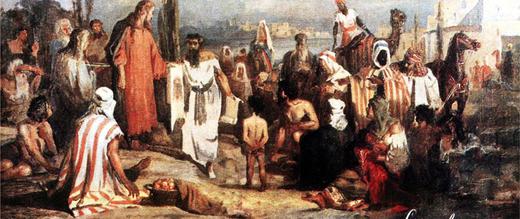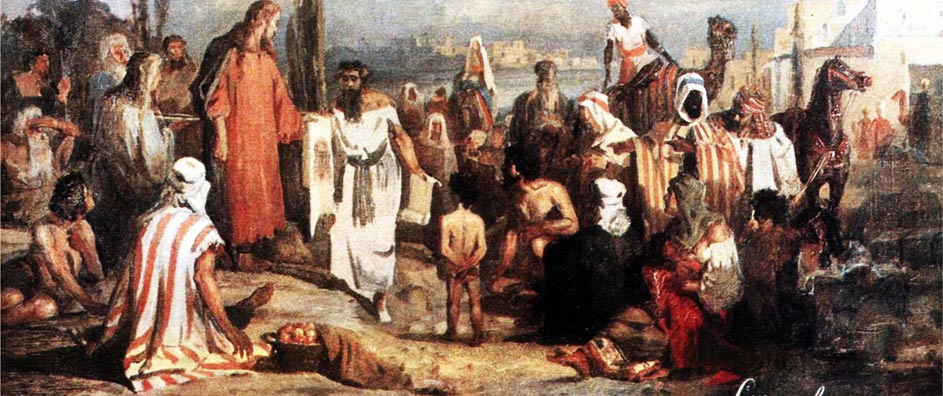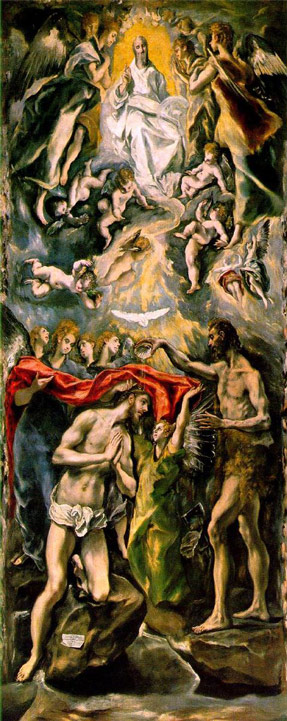The views expressed in our content reflect individual perspectives and do not represent the authoritative views of the Baha'i Faith.
This is Part 3 of the Jesus Christ in His Own Words series:
All the prophets have striven to make love manifest in the hearts of men. His Holiness Jesus Christ sought to create this love in the hearts. He suffered all difficulties and ordeals that perchance the human heart might become the fountain-source of love. Therefore we must strive with all our heart and soul that this love may take possession of us…. – Abdu’l-Baha, Baha’i World Faith, pp. 218-219.
In the last two articles in this series, we looked at a prophecy made by Moses in the Torah (Deuteronomy 18:6-8) that was fulfilled by Jesus in the Gospels (John 5:45-47) — a fulfillment confirmed by Peter in the Acts of the Apostles (3:19-26). These verses established that:
Jesus Christ claimed to be the Prophet like Moses foretold in the Torah. Jesus claimed that He, like Moses, received His revelation from God “face to Face”—something He confirms in John 6:46. His disciples, including Peter, understood Jesus as being part of a series of Divine Revealers of God’s word. (See also, Hebrews 1: 1,2)
Growing up as a Christian, I was taught that Jesus’ word was the final one — that there would be no further revelation of God’s word until the “End Times”. Nearly two thousand years after this supposed cessation of our dialogue with God, my questions to any clergyman who would listen were: “Why would God speak to mankind directly only once, so long ago and for so short a span of time? And why would His sole communication take place at a time when we lacked the ability to effectively record and spread His message?”
Further, if God had, as Peter says in the third chapter of Acts, been sending His Messengers “since the world began”, why did He stop? Surely, we needed His guidance now as much as ever — or more, since our capacity for self-destruction had grown exponentially.
My introduction to the Baha’i Faith—and through it to Islam, Buddhism and other faiths—suggested that revelation had not been limited to Christ’s mission here on earth, or even to what we think of as the Abrahamic religions. Moreover, my Baha’i friends suggested that Christ’s own words would testify to this.
My exploration of what the Baha’i Faith taught (which was more an attempt to refute it) led me to a careful, prayerful reading of the Bible. I was especially struck by what I read in Matthew chapter 7. Here, Jesus asks HIs listeners to understand the sort of God His Father is by considering how we — mere humans — treat our children:
Ask and it will be given to you; seek and you will find; knock and the door will be opened to you. For everyone who asks receives; he who seeks finds; and to him who knocks, the door will be opened. Which of you, if his son asks for bread, will give him a stone? Or if he asks for a fish, will give him a snake? If you, then, though you are evil, know how to give good gifts to your children, how much more will your Father in heaven give good gifts to those who ask him! – Matthew 7:7-10.
I thought about this passage, for the first time ever, as more than a comforting reference to God’s love. Can you imagine having several children, yet showing only one of them your love? Would you feed, clothe, and educate one child, while the others went hungry, naked, and ignorant, or were doomed to cobble together scraps of food, clothing, and knowledge, not from you directly, but from your favored child? If a human parent really did those things, most of us would consider him a criminal. Yet, I had believed that this was the way God behaved.
I had to ask myself: Would God give the Bread of Life to only one favored people and give stones to all others? Would He send His Word to only one nation at one time in all the history of the world, and allow false prophets to claim all others? If I believed Christ’s word, then the answer was a resounding “no”. It seemed clear from Jesus’ words and deeds that, as Peter said, “…God has spoken by the mouth of all His holy prophets since the world began.”
I had been taught that Jesus’ was the last revelation from God until the end of all things. Yet who among us can imagine that a human parent would speak to his child once when he was quite small, then utter nothing more and offer no further guidance or words of love until the child was on his death bed?
If we, who are imperfect, know how to give good gifts to our children, how much more so does the God Christ revealed know how to give gifts to those who ask?
Read the previous article in the Jesus Christ series – Jesus Christ: The Way of God
Read the previous article in the Jesus Christ series – Jesus Christ: Face to Face with God
You May Also Like
Comments



















12 “I still have many things to say to you, but you cannot bear them now. 13 However, when He, the Spirit of truth, has come, He will guide you into all truth; for He will not speak on His own authority,but whatever He hears He will speak; and He will tell you things to come. 14 He will glorify Me, for He will take of what is Mine and declare it to you. 15 All things that the Father has are Mine. Therefore I said that He will take of Mine and declare it to you.[c]"
Doesn't this discourse indicate - at least to them - that His revelation is not the last? And, who would this 'Comforter', this 'Spirit of truth' be? Secondarily, were it not for the source of the prophecy - Yeshua himself - would we all have considered Yeshua's revelation to be the last??
My first thought upon reading your comment was to wonder who you mean when you use the pronouns “our” and “we”—as in “why would WE need another middleman to tell us about God.”
Those of us who were raised in the fold of Christianity had Jesus Christ as a “middleman” or mediator. But, in reality, wouldn’t you agree that God’s message is for a larger WE—for all mankind? If that is the case, then WE includes the billions of souls who lived and died without ever hearing of Moses or Jesus. ...People living in India, Asia, etc. before and after Jesus’ advent. Even after Christ came, the faith spread slowly; there was no internet, no newspapers, no telephones. It took hundreds of years for Christianity to reach Europe. The Gospels were not written until decades after Christ’s ascension and they were carried on foot, by hoover transport and by ship to other lands. The disciples wrote letters not to nations, but to their congregations in different cities in and around Israel. Those epistles are few, and often focused on the problems of the individual groups. It took until the mid-1800s (that is, over a thousand) for Christianity to reach central Africa—a milestone that was taken by many Biblical scholars to be a sign of Christ’s return.
If you read my article carefully and ponder the passage from the Sermon on the Mount, I think you will agree that Christ is painting a portrait of a God who would not do what the doctrines of many churches teach—that some of God’s children got left out in the cold of remoteness, hungry for spiritual bread. do you not agree that the God Christ revealed in word and deed would feed them?
What I am trying to convey is that those billions of souls also had divine Mediators. A Lamp lighted by the same Holy Spirit—as Jesus says, “Another Counselor”. (“All that the Father has is Mine, therefore I say, he shall take of mine and show it to you.") I cannot read the words of Christ about the nature of God or His statement “I have many sheep that are not of this fold, them also I must bring” and not allow that God would provide spiritual nurture for all of His children in “diverse ways at sundry times” as the Book of Hebrews says. That Krishna and Buddha, for example, taught Their people the same spiritual truths Jesus taught is indisputable. They taught these things, though, in lands where the name of Moses was unknown centuries BEFORE the time of Jesus.
So, when the Bible says that God spoke to the nations through His prophets since the world began, is it not reasonable to believe it includes nations elsewhere in the world? I submit that it is not only reasonable, but completely supported by Jesus’ words and deeds.
I have to repeat my question from the article: Given what Christ tells us about God, how can we believe that He would give bread only to one people and stones to all others? Christ clearly says He would not. Now, I put your question back to you: when you can go to the Source—the words of Jesus Himself—why accept the opinions of others about what God has said?
My point, is this: The idea that Jesus' purpose was not to teach us how to BE, but to simply shed His blood was taught by church. That is not the purpose that Jesus claims for Himself. Do you know what Jesus says His purpose is? Two of the references He makes to it in the Gospels stand at the very beginning of His mission and at the very end.
I agree 100% that Jesus Christ came to show God’s love. In fact, I believe I’ve said so in my articles. His life was a supreme love sacrifice. Bahá’u’lláh wrote of Jesus, “He it was who purified the world.”
You asked: "Why didnt you ask God through prayer and be patient enough to hear the answer. I talk to God and hear God daily and I am sorry that you were not taught while a Christian that you can too.”
Bahiyyih, I did. I prayed fervently with all my heart and soul. The answers I got were contained in Matthew 7 and John 10 and the words of Bahá’u’lláh, which Christ, Himself, pointed me to. I would describe the experience I had the night I accepted Bahá’u’lláh, but it would take too much space. Let me say just this: I love Christ. I have loved Him since I was a small child. I have never stopped loving Him. Indeed, I love Him more now that ever. I have talked to Him, listened to His words, and pondered them deeply all my life. He has been like a loving elder brother, leading, loving, teaching me. I am a Bahá’í because of Jesus Christ. Because of the promises He made and kept. On January 18, 2014 at midnight, I will have been a Bahá’í for forty years. I still love Christ. And I love Him whether He is called Jesus or Husayn; Christ or Bahá’u’lláh.
By the way, your name, Bahiyyih, is much loved and revered among Bahá’ís, for it was the name of Bahá’u’lláh’s daughter, whose life was a testimony to the spiritual fruit of her Father’s message. Though suffering alongside her parents and brothers in prisons and through exile, she was loving, loyal, patient and true.
I hope you’ll continue reading this series of articles, perhaps some of your concerns will be answered.
It is up to us to spread His word. You say we did ...not have internet and you speak on what others did throughout History but you never speak on what You did as a Christian to seek His face, and spread His word. When I was a Bahai I spoke about the faith often. I taught in churches and at school. Now that I am a Christian I do the same and plan to become a minister. But prior to all the internet and all that there was word of mouth, writing letters, and good old fashioned fellowship. God left it up to us to spread His word. No middleman required. It seems as though all humanity needs a middleman to confirm to them that they are doing the right thing, or following the right way. But we tend not to wait on God to answer our prayers.
I wish you peace in your journey to seek God. But know that it wasn't Christ that failed you, but the Pharisees that mislead you away from Christ. Taste and you will see. God Bless!
Second, you have misunderstood me, and in such a way that I’m uncertain if you actually read my answer to your first comment, or read and understood my articles. I didn’t feel a “void” growing up as a Christian. My parents were both soul deep Christians. They lived ...their faith. They were active in every church we attended, both teaching Sunday school, my mother directing the choir. They were the best of parents, and I understood that it was their deep faith as well as their love for each other and for me that made them that. I think this was one reason why Jesus’ use of parents and children in explaining the nature of God (Matthew 7) finally got through to me.
You’re right, I didn’t say what I did as a Christian. My faith was at the center of my young life because it was the center of my parents’ lives and our family life. I studied the Bible avidly, prayed naturally, and loved Jesus dearly—which I noted in my previous reply. I was very active in our Christian community as a child and youth. I was what many people referred to as a “Jesus Freak”. I sang in a traveling youth choir called the Salt Shakers (as in Save A Life Today and the ‘salt of the earth’) and taught Christ’s love because I was completely in love with Christ.
I’m still completely in love with Christ. No one mislead me away from Him. If anything, I was brought back to Him by Bahá’u’lláh. I said it before, Christ never stopped guiding me, and as I made the decision to become a Bahá’í, I prayed earnestly to Christ every moment and bared my soul to God.
Yes, I had questions—but none were about Christ's authority, His divinity, or His reality. They were about church dogma. Chiefly about the disconnect between the God of love that Jesus revealed—the God who’d sent His Messengers to live and die for us since the world began—and the church doctrine that only Christians were “saved”. I could accept that doctrine only if I held the false belief that the population of the earth at the time of Christ was limited to the lands of the middle east or the other countries that the disciples would reach. But there were people all over the planet that Judaism and Christianity never reached. Before there was a Moses, there had already been a Krishna who taught that He was the Way to God. Before Christ Jesus, there had already been a Buddha who taught that He was born into the world as the King of Truth for the salvation of the world. Is there anything in the Bible to suggest they were not Prophets of the same God that Moses and Jesus taught?
When I reached college age, I began an earnest search for a community that reflected the teachings of Christ. I began to read the Bible with the intention of understanding Christ’s message for myself. When I did, it became clear to me that the God Christ revealed would NEVER starve any of His children. I now can’t believe I ever thought that He would. You asked what answers I got from clergymen about that. Some told me that God would do “something” for those souls though they couldn’t say what. Some said they would be rescued after the fact—that when Christ came again, they’d be brought out of hell (a hell they didn’t deserve) and given a chance to accept Him.
Those answers simply don’t tally with Christ’s teachings about who He and the Father are.
What pulled me out of the churches was the realization that church doctrine was not what Christ taught and that I had mistaken the doctrines of men for the commandments of God. Christ warns about that (Matthew 15:9). My mother, who was an amateur Bible scholar, taught me a very important lesson. “Never question the authority of God. Always question the authority of men.” That’s why I asked questions and that’s why felt the need to understand the Gospel of Christ for myself.
That is also what led me to the Bahá’í Faith. Jesus, Himself, brought me to Bahá’u’lláh. He said “My sheep shall know My Voice”. When I read the words of Bahá’u’lláh, I heard that Voice—the Voice of God, not the voice of a “middleman”.
I said in my article that I became a Bahá’í by setting out to disprove Bahá’u’lláh. My mother set about the same task—disproving Bahá’u’lláh to try to save her daughter’s soul. She became a Bahá’í about six months after I did, sold her house and most of her belongings, and went travel-teaching.
I think you misunderstood my point about the internet. It was this: At the time Christ ascended, there were only a handful of disciples. They taught by speaking to crowds and teaching one on one. They didn’t have books of Christ’s teachings to share, even if their audiences could have read them. They had the Torah and a fragmentary record of letters and stories until 325 AD when the Nicene Council finally settled on which from among all the diverse stories and writings about Christ would go into the Christian Bible. So, the Gospels and Epistles we have today weren’t collected officially until over 300 years after Christ’s ascension. And even then not all churches use the same collection of books. Here’s my point: The message spread so slowly that uncounted millions of souls worshiped and prayed and died in lands that message never reached. 1,800 years passed before Christ’s message made it around the world. Yet, I was taught that a person’s salvation depended upon knowing Christ and believing certain things about Him (which varied depending on which of the 31,000 sects of Christianity one looked at). That meant billions of souls were lost in remoteness from God for centuries—according to church doctrine. Yes, those people spoke to God, but if I were to believe the doctrine of the churches, He didn’t hear them and didn’t speak to them. Do you believe that’s possible? I don’t.
In a recent commentary, Pope Francis said: "The faith passes, so to speak, through a distiller and becomes ideology. And ideology does not beckon [people]. In ideologies there is not Jesus: in his tenderness, his love, his meekness. And ideologies are rigid, always. Of every sign: rigid. And when a Christian becomes a disciple of the ideology, he has lost the faith: he is no longer a disciple of Jesus, he is a disciple of this attitude of thought… For this reason Jesus said to them: ‘You have taken away the key of knowledge.’ The knowledge of Jesus is transformed into an ideological and also moralistic knowledge, because these close the door with many requirements.”
This ideology the Pope speaks of is what I rejected when I renewed my search for Christ and found Bahá’u’lláh. I’m sorry you didn’t connect to Him or His teachings. I have no way of knowing why you didn’t—that is between you and God. I only know that I came to Him like one dying of thirst or being reunited with my Best Beloved. If you’ve ever read the story of Majnun and the night watchmen in Seven Valleys and the Four Valleys, you might understand what I mean.
But, here is a question for you to consider: How could the God Christ revealed create a system of salvation in which one was only saved if she believed that God spoke to mankind directly for only three years in a remote corner of the Roman Empire? Look into your heart, read the words of Christ and ask yourself if the God of Christ would condemn souls who missed His message only because of where and when they were born.
The answer I got when I asked this question of God came from Christ’s own words—it is that the God of Christ and Bahá’u’lláh (and Krishna and Buddha) is more gracious, more merciful, more loving and more wonderful than most theology has allowed. He has taught us since the world began and His plan goes far beyond the salvation of individual souls to the regeneration of the entire planet.
If I had any doubts that that level of transformation is possible, I would have only to look at Abdu’l-Bahá, whom Bahá’u’lláh refers to as “the Mystery of God". I realized as I looked up at the photograph of Abdu’l-Bahá in our local Bahá’í Center one evening during devotions, that if I knew nothing about the Bahá’í Faith or Bahá’u’lláh’s message but Abdu’l-Bahá, I would still believe, for he was the living, breathing embodiment of the teachings of Christ, whom I love.
Again, I apologize for the length of this. I pray you have the patience to read the entire thing and consider it prayerfully.
But the answers were not forthcoming from the pastors. They seemed shocked and puzzled when I told them about what I read in Bible. None of them could explain the contradictions.
What I was told is that I either believed in the entire Book as it was written, or not at all. It wasn't until I became a college student that I began to read more about the history of Christianity that I realized the Bible has been taken out of its historical context, and to understand what was bring said and why, the history of the Abrahamic religions AND the world that the religions tried to bring closer to God must be understood. Most Baptist preachers are not scholars, historians or theologians; they followed the doctrine that they were taught. Realizing that helped me in my spiritual journey, but it didn't answer most of my questions.
Like Maya, I love Jesus even more now than I did when I was a little girl wandering around looking for a church home with her beloved Bible in her hands. Now, as a Baha'i, the Bible and other religious texts make a lot more sense to me. I like to think that major religions are all in one gloriously divine and eternal Book. It might not conform to what we.have been led to believe about
religions, but that's because humanity's tendency to be self-centered to the extreme. We want what we want and our viewpoint should be accepted as the truth. It wasn't until I was adult and a Baha'i that I finally understood true humility and acceptance.
God created this world, not us. His vision encompasses the entire multi-verses; ours can only embrace what it sees and comprehend right now on this planet. And we don't understand much about this planet either! How can possibly understand what we didn't create? That's why He created Manifestations, who were humans destined to be infused and animated by the Holy Spirit to help understand what we can't on our own.
I talk to God all the time, and I've been given answers when I quiet my mind. But I STILL do not have the fullness of God's knowledge. And I never will.
I was full of questions, too, as a young child. I'm sure I drove my parents and pastors nuts with questions like, "Why did God stop talking to us? Why aren't there more prophets? What happens to all the other people who aren't Christians?"
Ironically, Bahá'u'lláh not only answered those questions, but He showed me that Christ had already answered many of them already—I just hadn't understood. Christ proved Bahá'u'lláh to me and Bahá'u'lláh reconfirmed me in my belief in Christ.
Neither Ms Geller nor none of the folks who posted to support her view that Mr. Obama was out of line with Christian teaching and therefore to be hated seemed to recognize the words the last ...words he spoke there as having come from their own scripture. What transpired on this supposedly Christian site was a promotion of a hatred completely out-of-keeping with the word of Christ. It was sad to see.